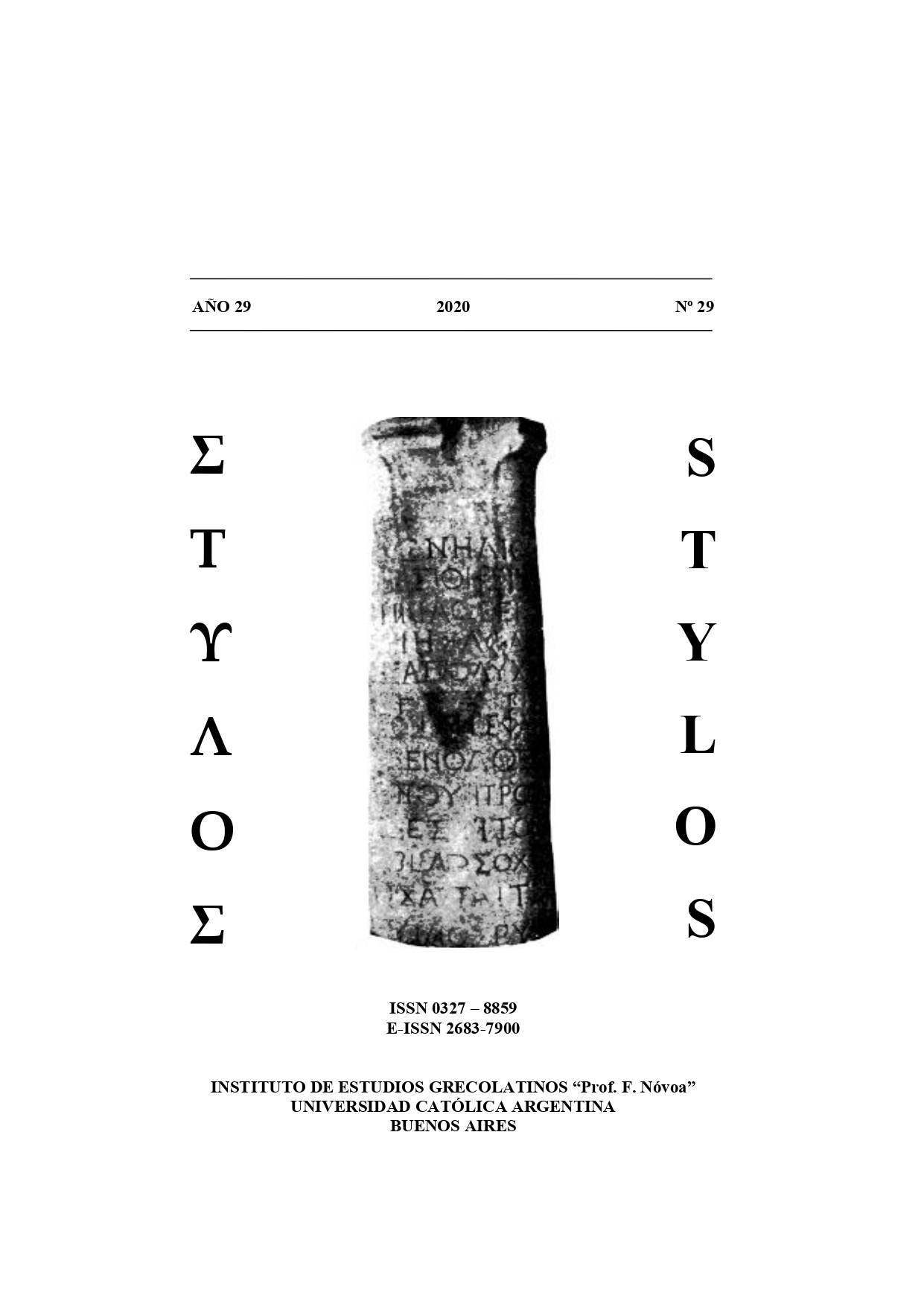AMISTAD Y EPICUREÍSMO
Palabras clave:
Epicureísmo, amistad, humanización, seguridad, memoriaResumen
En el presente trabajo me ocupo de varios textos poco tratados en las exposiciones usuales acerca de la amistad en el epicureísmo e incluso algunos de ellos ausentes hasta hace muy pocos años en el debate sobre dicho tema. Me referiré, en primer lugar, a la genealogía de la amistad y la piedad que presenta Lucrecio en el libro V de De la naturaleza de las cosas. Analizaré, en segundo lugar, el papel de la amistad en la tematización de uno de los principales aspectos de la seguridad (ἀσφάλεια) que Epicuro atribuye al modo de vida que propugna: la confianza. Finalmente, me centraré en las consideraciones de Filodemo sobre la amistad entre los dioses y en una vertiente de la amistad humana que, según los epicúreos, la asemeja a la divina: el recuerdo del amigo fallecido.Descargas
Citas
AOIZ, J., Y DENIZ, D. Elementos de Ética, Extractos de Estobeo y Glosas de la Suda de Hierocles el estoico, Salamanca: Universidad Pontificia de Salamanca, 2014.
ARMSTRONG, D. “Epicurean Justice”, Phronesis 1997 42: 324-334.
ARMSTRONG, D, “Epicurean virtues, Epicurean friendship: Cicero vs the Herculaneum papyri”, 105-128. En: J. Fish and K. Sanders, Epicurus and the Epicurean Tradition Cambridge: Cambridge University Press, 2011.
ARMSTRONG, D. “Utility and Affection in Epicurean Friendship: Phil-odemus On the Gods 3, On Property Management, and Horace, Sermones 2.6”, 182-208. En: R. Caston and R. Kaster (eds.), Hope, Joy, and Affection in the Classical World, Oxford: Oxford University Press, 2016.
ANNAS, J. The Morality of Happiness, New York-Oxford: Oxford University Press, 1997.
CAPASSO, M. Carneisco Il Secondo Libro del Filista (Pherc 1027), Napoli: Bibliopolis, 1988.
CAMPBELL, G. Lucretius on Creation and Evolution A Commentary on De rerum Natura V 772-1104, Oxford: Oxford University Press, 2003.
DIELS, H. Philodemus über die Götter, Drittes Buch. I (text), Ber-lin: Abhandlungen der Königlich Preussischen Akademie der Wissenschaften, 1917.
DIELS, H. Philodemus über die Götter, Drittes Buch. I (Erläuterung des Textes), Berlin: Abhandlungen der Königlich Preussischen Akad-emie der Wissenschaften, 1917.
ERLER, M. “Epicurus as deus mortalis: Homoiosis theoi and Epicurean Self-cultivation”, 159-181. En: D. Frede and A. Laks (eds.), Traditions of Theology Studies in Hellenistic Theology, Its Background, and Aftermath, Leiden: Brill, 2002.
ERLER, M. Epicurus. An Introduction to his Practical Ethics and Politics, Basel: Schwabe Verlag, 2020.
ESSLER, H. “Die Lust der Freundschaft und die Lust des Freundes von Epikur bis Cicero”, 139-160. En: M. Erler und W. Rother (eds.), Philosophie der Lust Studien zum Hedonismus, Basel: Schwabe Verlag, 2012.
ESSLER, H. “Freundschat der Götter und Toten mit einer neue Edition von Phld Di III Frg. 87 und 83”, Cronache Ercolanesi, 2013 43: 95-111.
FRAISSE, J.-C. Philia La notion d’amitié dans la philosophie antique, Paris: Vrin, 1974.
HOLMES, B. “The Poetic Logic of Negative Exceptionalism in Lucretius, Book Five”, 154-191. En: D. Lehoux and A. D. Morrinson (eds.), Lucretius: Poetry, Philosophy, Science, Oxford: Oxford University Press, 2013.
GLAD, C. Paul and Philodemus Adaptability in Epicurean and Early Christian Psychagogy, Leiden: Brill, 1995.
KONSTAN, D. “Mankind’s Past: Evolution or Progress?”, 17-25. En: C. Mussini and S. Rocchi (eds.) Imagines Antiquitatis: Representations, Concepts, Receptions of the Past in Roman Antiquity and the Early Renaissance, Philologus supplementhal 7, 2017.
LEVY, C. “Cicéron et l’épicureisme: la problématique de l’éloge para-doxal”, 61-76. En: C. Auvray-Assayas et D. Delattre (eds.), Cicéron et Philodème, Paris: Rue D’Ulm, 2001.
MANUWALD, B. Der Aufbau der Lukreiszischen Kulturentstehungslehre, Mainz: Franz Steiner, 1980.
MITSIS, P. Epicurus’ Ethical Theory: the pleasures of invulnerability, Ithaca and London: Cornell University Press, 1988.
NAGLE, D. The Household as the Foundation of Aristotle’s Polis, Cam-bridge: Cambridge University Press, 2006.
NÉMETH, A. Epicurus on the Self, London: Routledge, 2017.
O’CONNOR, D. “The Invulnerable Pleasures of Epicurean Friendship”, Greek, Roman, and Byzantine Studies 1989 30: 165–86.
O’KEEFE, T. “Is Epicurean Friendship Altruistic?”, Apeiron, 2001 34: 269-305.
PAGANINI, G. “Early Modern Epicureanism Gassendi and Hobbes in Dialogue on Psychology, Ethics, and Politics”, 671-710. En: P. Mitsis (ed.) Oxford Handbook of Epicurus and Epicureanism, Oxford: Oxford University Press, 2020.
PÉRILLIÉ, J.-L.“Colotès et la béatification épicurienne de l’amitié”, Les études philosophiques, 2005 73: 229-259.
SEDLEY, D. Lucretius and the Transformation of Greek Wisdom, Cam-bridge: Cambridge, University Press, 2004.
TAUSSIG, S. Gassendi, Vie et moeurs d’Epicure, Paris: Les Belles Lettres, 2005.
USENER, H. “Epikurische Spruchsammlung”, Wiener Studien, 1888 10: 176-191.
VAN BERKEL, T. The economics of friendship: changing conceptions of reciprocity in classical Athens, Leiden University, Leiden, 2012.
WEIL, H. “Recueil de sentences d’Épicure” Journal des Savants, 1888, 657-663.
Descargas
Publicado
Cómo citar
Número
Sección
Licencia






